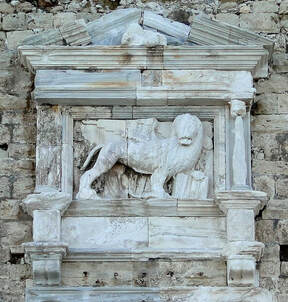|
The greatest influence to Medieval Cretan culture derives from the Venetian administration (Republic of Venice) in the years 1204-1669 (for almost 400 years) when Venice was a rich and dominant naval empire in the Mediterranean Sea. During that period, Crete, in an era of general brutality of the Middle Ages had the rear privilege to meet a very compatible human culture with its own, the humanism of the Venetian Renaissance that produced Greek poets and artists like Vitsentzos Kornaros (Erotokritos) and Domenikos Theotokopoulos (also called El Greco). Cretans interacted with the Venetian Renaissance which had a high level of architectural culture, painters, musicians and literature. Venice was the center of typography in Europe at that time and was like the British Empire 200-400 years later. Even Shakespeare wrote about Venice in his play "The Merchant of Venice".
Especially in the so called High Renaissance (1500-1520) the whole of Italy was a place of high culture with exceptional works of art and artists such as Leonardo da Vinci's Mona Lisa, Michelangelo and Raphael's The School of Athens. This period had a big influence in the culture of the rest of Europe later, with, for example, authors including Cervantes Don Quixote in Spain and William Shakespeare in England. So, the Cretan culture had a big advantage because it was part of this great cultural civilization. During the Venetian years Cretan scholars went abroad and studied in Venice or in other Italian Universities. A representative example of Cretan Renaissance writers was Vitsentzos Kornaros with his romantic epic poem Erotokritos characterized by many features of the Cretan dialect of Greek, which is regarded a work of art of high standard, equivalent to the plays of Shakespeare or the works of Cervantes Don Quixote in Spain. In addition, the famous Greek painter El Greco was born roughly in this same period of Italian renaissance in Crete near today Heraklion city. Those two Greek cultural figures had a powerful impact on the continuity of Greek civilization and still have. Kornaros wrote Erotokritos in Medieval Greek language which is still in use in Greece in the same form which everybody understands and it proves the continuity between the ancient Greek language and the Modern Greek language. Today in Heraklion city and in other cities in Crete the Venetian buildings and architecture are well preserved and local population still feels proud of that period of its history. It was a period of enlightment, free trade and high culture as part of the very advanced Venetian Renaissance that had a great impact on humanity. The question raised is what the meaning of this example may be. The history is not only or even mainly about conquers and wars. A significant part of human history is about culture, and we may see a country or empire declining but we are still be able to see their artifacts which influence the human civilization tremendously. The Venetian culture, in particular, left a vast impact on western civilization. When we are telling stories, or when we see the arts or building structures or doing businesses we unconsciously recall our western roots. In this sense the modern Cretans are very proud of their roots ancient and medieval and feel that they were there at the makings of the modern western world. Modern Crete has a disproportionally large number of musicians of Cretan traditional music (almost every small village has one or two) and Crete has a nobel prize winner in poetry (Odysseas Elytis) and a world famous writer Nikos Kazantzakis (also candidate for the nobel prize in literature). In every small village of Crete today, every child knows how to make a "mantinada" which is like a short poem. All these things are influences of a tradition that still lives on from the Venetian Renaissance era .
0 Comments
Your comment will be posted after it is approved.
Leave a Reply. |
Archives
April 2023
Categories
All
|
Location
|
AWARDs
|
|


 RSS Feed
RSS Feed

